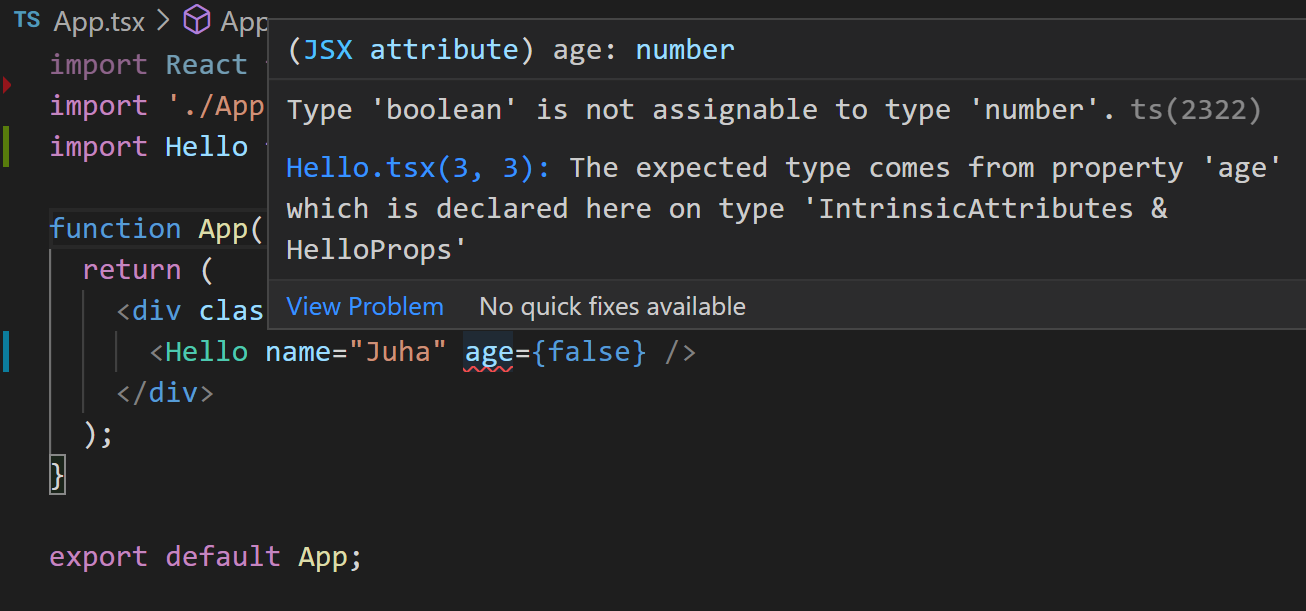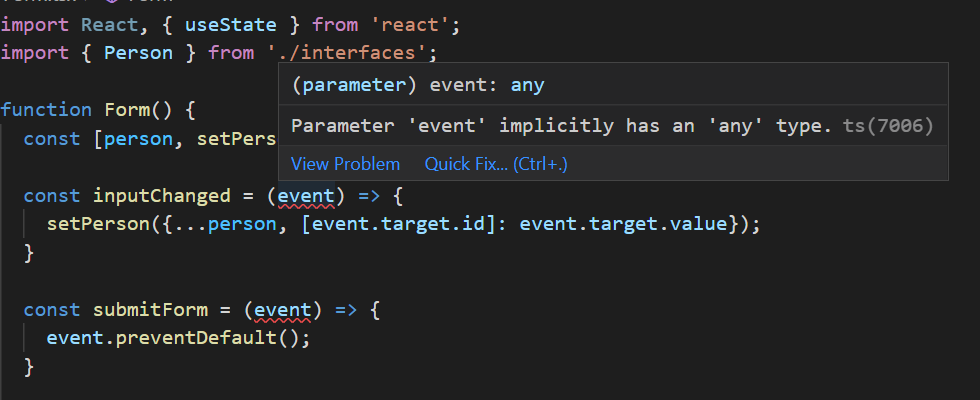TypeScript
TypeScript - Basics
- TypeScript is strongly typed programming language (https://www.typescriptlang.org/) that is based on JavaScript.
- Benefits of using TypeScript:
- Catch errors before pushing your code to production.
- Code is easier to understand and refactor/maintain.
- Provides more information to developer (Self documented)
- More popular nowadays (Great skill)
- You can try TypeScript in your browser: https://www.typescriptlang.org/play
- You can install TypeScript into your project using the npm:
npm install typescript --save-dev
- Then you can run TypeScript compiler using the following command:
npx tsc
- You can also install TypeScript globally and then
tsccommand is available in all locations in your terminal. - VSCode provides nice features for TS development. Read mode here: https://code.visualstudio.com/docs/languages/typescript
Type inference
- TypeScript will automatically define the type when you initialize a variable. In the following example, we declare variable
helloworldand assign it to a string value. If we try to re-assign it with other type, we get an error.
- The most common primitive types are:
string,numberandboolean - See the different types: https://www.typescriptlang.org/docs/handbook/2/everyday-types.html
- You can also set explicit type to a variable:
let name: string;
let age: number;
- You can check the type using the
typeof:
typeof name === "string" // true
typeof age === "number" // true
- If the type is not known when you write code, you can use
unknowntype.
let a: unknown = 10;
a = "It should be string";
- If you want to exlude type checking, you can use
anytype.
let a: any = 10;
- The
unknowntype is a safer alternative toany. It represents any value, but you cannot perform operations on it without first asserting its type. The code below demonstrates the difference betweenanyandunknown.
Using unknown:
let value: unknown;
value = 42; // This is OK
value = "hello"; // This is OK
value = true; // This is OK
// Type checking is required before using the value
if (typeof value === "number") {
let num: number = value;
}
Using any:
let value: any;
value = 42; // This is OK
value = "hello"; // This is OK
value = true; // This is OK
// Type checking is not required
// This is OK, but potentially unsafe
let num: number = value;
Functions
- You can define the type of parameters and return value
function calc(x: number, y: number): number {
return x * y;
}
- In JavaScript function parameters are optional by default.
- In TypeScript, you will get an error if you don't pass all function parameters. To make function parameter optional, you can use
?after the parameter name.
function sayHello(name: string, age?: number): string {
if (!age)
return `Hello ${name}`;
return `Hello ${name}, you are ${age} year(s) old`
}
- Now, you can call function in the following ways:
sayHello("John");
// or
sayHello("John", 20);
- If there is no return value, you can use the
voidkeyword:
function logMessage(message: string): void {
console.log(message);
}
Arrays
- Arrays are declared with the following syntax:
const arr: type[];
- For example:
let names: string[];
names = ["John", "Lisa", "Mike"];
// You can also use Array() constructor
let nums: number[] = new Array(10);
nums[0] = 4;
- You can also combibe more complex types
- Unions:
type MyStates = "awake" | "sleep" | "eating";
- Generics:
type NumArray = Array<number>
Structural types
- Structural types (define entities) are used a lot with React. For example, typing component props.
- You can use
interfaceortypekeyword.
interface Person {
name: string;
age: number;
}
type Point = {
x: number;
y: number;
}
- See the difference between types and interfaces: https://www.typescriptlang.org/docs/handbook/2/everyday-types.html#differences-between-type-aliases-and-interfaces
- If you have nested objects in your entities, for example:
interface Person {
name: string;
age: number;
address: {
street: string;
number: number;
zip: number;
}
}
- Instead of using nested object, you can create
Addressinterface
interface Address {
street: string;
number: number;
zip: number;
}
interface Person {
name: string;
age: number;
address: Address;
}
React & TypeScript
- You can use TypeScript in your Vite React project by selecting TypeScript variant when creating a Vite project:
npm create vite@latest
- React provides
@types/reactand@types/react-dompackages that offer useful types for React. If you create Vite project using TypeScript, these packages are installed as development dependencies. There is also a configuration filetsconfig.app.jsoncreated in the Vite project for TypeScript, and it specifies the compiler options required to compile the project.
Component props
- You can define the type for the function component
props(=function arguments)
interface HelloProps {
name: string;
age: number;
}
function Hello({name, age}: HelloProps) {
return(
<div>
Hello {name}, you are {age} years old!
</div>
)
}
export default Hello;
- Now, if you pass value that doesn't match to defined type, you will get an error.

- You can define optional props using the
?, for example:
interface HelloProps {
name: string;
age?: number;
}
function Hello({name, age}: HelloProps) {
return(
<div>
Hello {name}
{ age && <>, you are {age} years old!</>}
</div>
)
}
export default Hello;
- If the props value is a function, the definition is following:
interface HelloProps {
name: string;
age?: number;
myFunc: () => void; // no parmeters and return value
}
interface HelloProps {
name: string;
age?: number;
myFunc: (msg: string) => void; // function parmeters
}
Function components
- You can also define the return type for your component and you will get an error if something else is returned. The
JSX.Elementis a type that represents a React element. It is the return type of a functional component in React. This type is used to ensure that the component returns a valid JSX element.
interface HelloProps {
name: string;
age: number;
}
function Hello({name, age}: HelloProps): JSX.Element {
return(
<div>
Hello {name}, you are {age} years old!
</div>
)
}
export default Hello;
useState hook
- Type interference works with useState hooks function. For example, if you declare following state:
const [isReady, setReady] = useState(false);
- Now, if you update the state using wrong type, you will get an error:
setReady(10);

- If you have complex state, you can use
interface, for example:
// declare interface
interface IUser {
firstname: string,
lastname: string,
age: number
}
// useState hook
const [user, setUser] = useState<IUser | null>(null);
// or if nullish values are not accepted
const [user, setUser] = useState<IUser>({} as IUser);
- You can also explicitly define types. For example, if you want to initialize state with
nullorundefinedvalue.
const [value, setValue] = useState<string | undefined>(undefined);
- Specifying type for array state
const [values, setValues] = useState<Array<string>>([]);
Forms & Events
- In the example below, the
inputChangedfunction is used to handle input element change events. In TypeScript, you have to define event types, otherwise you will the following error.

- The type for input element change event is
React.ChangeEvent - The type for form submit event is
React.FormEvent, like shown in the following code.
const handleChange = (event: React.ChangeEvent<HTMLInputElement>) => {
setPerson({...person, [event.target.id]: event.target.value});
}
const handleSubmit = (event: React.FormEvent<HTMLFormElement>) => {
event.preventDefault();
// Do something with data
}
-
The whole
Formcomponent source code: https://github.com/juhahinkula/reactts/blob/main/src/Form.tsx -
If you have interfaces or types that are common to multiple files, you can define these in a separate file and use
export.
// interfaces.ts
export interface Address {
street: string;
number: number;
zip: number;
}
export interface Person {
name: string;
age: number;
address: Address;
}
- Then you can import interfaces to modules where these are used:
import { Person } from './interfaces';
Further reading
- React TypeScript Cheatsheets https://react-typescript-cheatsheet.netlify.app/
- React documentation https://react.dev/learn/typescript
